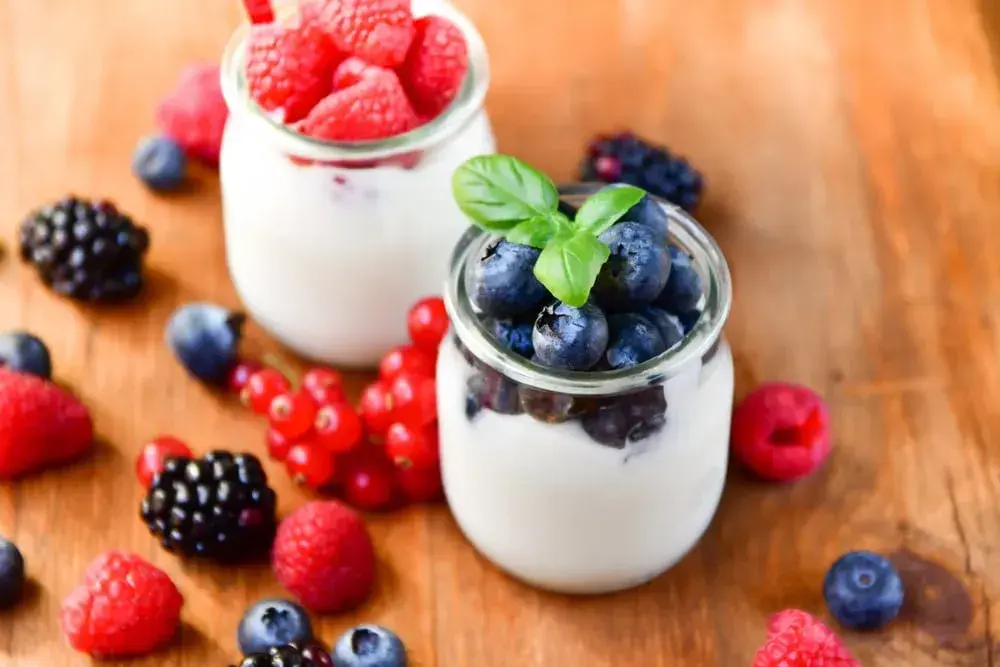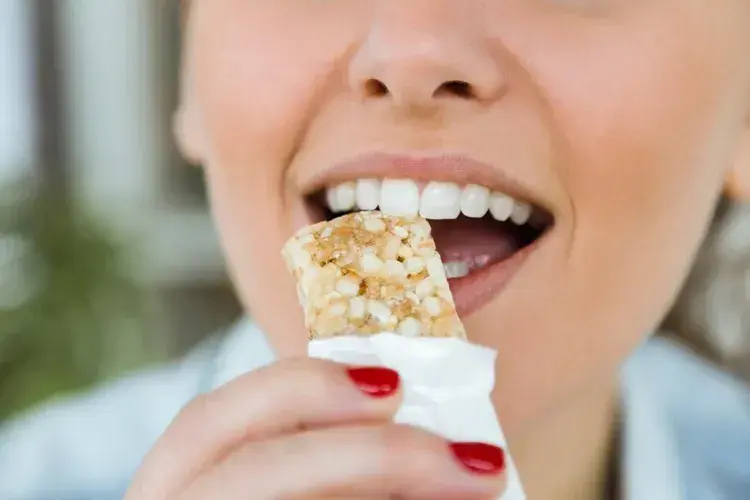6 min read
10 Reasons You Have Food Cravings — And How To Control Them Even On Your Busiest Days
Garcia Weight Loss
:
May 13, 2019 12:00:00 AM

/assets/images/provider/photos/2579947.jpg)
If you’re trying to lose weight, food cravings can be a major obstacle. You know all the rules for healthy eating, but it’s hard to resist when you get a craving for something sweet or salty.
You may think that cravings just mean you miss your favorite junk foods, but actually they are often an indication of a nutritional deficiency or other medical issue.
Cravings can occur for a number of reasons, such as stress, not getting enough sleep, and eating too-small portions throughout the day that deprive your body of nutrients. All of these factors and more can upset the balance of your hunger hormones and trigger food cravings.
The good news is, cravings can often be controlled through changes in your diet or lifestyle. Here are 10 reasons you may experience food cravings, and how you can effectively control cravings even on your busiest days.
1. You’re dehydrated
Food cravings — particularly sugar cravings — are one of the tell-tale signs of dehydration. Lack of fluid intake interferes with your body’s ability to properly metabolize glycogen for energy. Glycogen is the converted form of glucose stored by the muscles and liver. Without enough glycogen, your body will crave sugar for an energy boost.
Next time you’re craving sugar and sweets, drink a glass of water. It’s highly likely your sugar cravings will pass — indicating that all you need to do is consume more water throughout the day. For an added bonus, squeeze some lemon into your water. Some people find that drinking water with lemon helps control their appetite.
2. You’re lacking sleep
Sleep deprivation can cause your body to produce higher amounts of the stress hormone cortisol. Higher cortisol production can cause other hormone levels to fluctuate — including feel-good brain chemical dopamine and hunger hormones leptin and ghrelin.
This hormonal imbalance can cause you to crave and overeat junk foods and comfort foods that make you feel happy. A study published in 2013 showed that a lack of sleep led to cravings for sweet, salty, and starchy foods. Aim to get between seven and eight hours of sleep per night to help rebalance your hormones and put an end to food cravings.
3. You have diabetes or prediabetes
If you’re feeling especially thirsty and craving liquids, it’s possible your blood glucose levels are too high as a result of eating high amounts of sugar. When your body becomes resistant to high amounts of sugar, you have a higher risk for prediabetes and type 2 diabetes.
Cravings for liquids are your body’s attempt to flush out excess sugar in the form of waste. Cut way back on eating foods high in sugar to reduce feelings of thirst. However, keep drinking water to avoid dehydration.
4. You’re eating the same meals repeatedly
Eating the same foods repeatedly on a daily or weekly basis can trigger cravings for junk foods. This behavior may indicate that your body has grown bored with your meal choices and needs more variety. Studies show that people who eat the same foods daily will often crave foods that have different flavors and textures.
To control cravings triggered by eating the same meals repeatedly, start tracking the meals you eat and times you experience cravings to see if the two are linked. Then, start experimenting with new foods, herbs, and spices that can keep your palate satisfied while also driving weight loss.
5. You’re deficient in iron
Do you ever experience cravings for ice cubes? If so, it’s highly possible you may be suffering from iron-deficiency anemia. Though ice cubes don’t contain iron, studies show that munching on ice cubes increases alertness in those who suffer from anemia.
Start adding more iron-rich foods to your diet in the form of leafy greens, cruciferous vegetables, nuts, seeds, and legumes. You may also benefit from taking a multivitamin that contains iron.
6. You’re about to have a migraine
Health care experts say that migraines are often preceded by food cravings that occur as early as three days before the migraine hits. Craving chocolate and other sweets is a common side effect of migraines, and indicates that migraine symptoms may begin anywhere within a few minutes to a few days.
Start keeping track of the times and dates you experience cravings and migraines to determine whether there’s a link. Then, schedule an appointment with your doctor to identify the root cause of your migraines.
7. You’re not eating enough protein
Though it may seem like a good idea to limit yourself to carrot sticks for lunch, this can deprive your body of protein and lead to low energy levels. Healthy foods like fruits, vegetables, nuts, and seeds are healthy snacks, but aren’t always hearty enough to keep you feeling alert and energetic for hours at a time on their own. Many people require high-protein foods like turkey, chicken, fish, and eggs to feel sated and energetic until the next meal.
If you’re not getting enough protein, you may be hungry again soon and go running to the nearest vending machine. High-protein foods keep you feeling full for longer periods of time, so make a point of including these foods in every meal. For instance, opt for a lunchtime salad topped with a chicken breast or hard-boiled egg to ensure you’re getting a balanced meal. If you continue to experience food cravings, eat a handful of almonds or carrot sticks with a side of peanut butter.
8. You’re under too much stress
Whether you’re working at an office or at home taking care of children, being in a stressful environment can lead to food cravings. Stress increases your body’s production of cortisol — a hormone shown to stimulate the appetite and induce cravings by throwing off the body’s other hormones.
Start paying attention to stress signals and find other ways of combating stress, such as meditation or exercise.
9. You’re cutting out the wrong fats
Not all dietary fats are unhealthy. While you should be avoiding foods that are high in trans fats and saturated fats, it’s important to include sources of unsaturated fat in your diet. Eliminating all types of fat will cause your body to react by craving more fat — leading to unhealthy food choices.
Make sure you get some form of healthy fat in each meal such as fish, olive oil, avocado, and nuts. Fatty fish like salmon, mackerel, and tuna are high in omega-3 fatty acids — nutrients that contribute to improved sleep, good heart health, and weight loss.
10. You’re not exercising enough
Regular physical activity can help you control cravings by naturally regulating your body’s hormones and stress levels. Whether you’re into aerobics, a particular type of sport, or simply jogging in the park with your dog, constant movement will help you fight off hunger pangs. Regular exercise offers countless benefits, and will also help you get closer to your weight-loss goals.
Can food cravings be healthy?
Food cravings of any kind aren’t necessarily a good sign, since cravings normally indicate that your body is lacking certain nutrients. However, you can start viewing food cravings in a more positive light by recognizing them as a sign you need to incorporate healthier foods in your diet. Start eating more fruits, vegetables, poultry, fish, and other sources of clean protein to battle food cravings, improve your health, and lose more weight.
How to control cravings at night
Nighttime food cravings commonly affect people who don’t eat enough throughout the day as they attempt to control food portions and manage calorie intake. This approach can backfire and lead to severe cravings and binge eating at the end of the day.
Control food cravings at night by eating a healthy breakfast every morning, eating regularly throughout the day, and managing stress. Make sure that every meal contains plant compounds, protein, and a healthy source of fat. The plant compounds provide the vitamins and minerals your body needs, and the protein and fat will help you remain full longer.
Other ways you can control cravings at night include getting enough sleep and going to bed earlier, and taking the right supplements to prevent nutritional deficiencies.
What supplements control sugar cravings?
If you’re prone to sugar cravings, make sure you’re getting enough magnesium. Magnesium supplements help your body regulate glucose, insulin, and dopamine — all of which are hormones and neurotransmitters that can lead to sugar cravings when off-balance.
Zinc is also effective at regulating glucose and insulin. An amino acid called L-glutamine has been found to help reduce and/or eliminate cravings by regulating blood sugar. If you’re experiencing problems with sugar cravings, ask your doctor about nutritional supplements that can help you get back on track with healthy eating.
What foods control sugar cravings?
Most whole foods like fruits, vegetables, whole grains, nuts, seeds, legumes, poultry, and meats are effective at naturally controlling and regulating sugar cravings. Start eating more of these foods — specifically berries, chia seeds, sweet potatoes, dates, eggs, prunes, and fermented foods like kimchi and kombucha. These foods contain high amounts of fiber, protein, antioxidants, and many other compounds that help control cravings.
Dark chocolate is also effective at warding off food cravings, but make sure you choose brands that contain at least 70% cacao, and that lack high amounts of additives.
Do you need help cleaning up your diet, losing weight, and achieving better overall health? Garcia Weight Loss offers personalized weight-loss programs designed to help you look and feel your best. Contact us today for your no-cost consultation!



